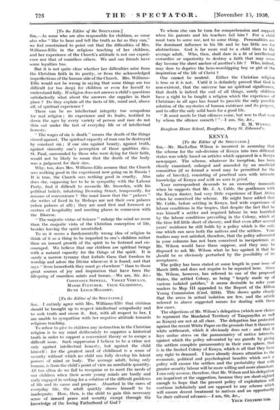KENYA
[To the Editor of the SPECTATOR.] SIR,—Mr. MacLellan Wilson is incorrect in assuming that the scheme for the sub-division of Kenya into two different states was solely based on articles which appeared in a Kenya newspaper. The scheme, whatever its inception, has been closely examined, enlarged and amended by an unofficial committee (if so formal a word may be permitted for the sake of brevity), consisting of practical men with intimate knowledge of Kenya and with no axes to grind.
- Your correspondent descends to an unworthy innuendo when he suggests that Mr. .1. A. Cable, the gentleman with the Kenya duster, had very little experience of East Africa when he conceived the scheme. He might have added that Mr. Cable, before settling in Kenya, had wide experience of labour conditions in the tropics, that despite the fact that lie was himself a settler and required labour he was horrified by the labour conditions prevailing in the Colony, which at the time fell little short of slavery, and that even after several years' residence he still holds by a policy which is the only one which can save both the natives and the settlers. Your readers may rest satisfied, therefore, that the policy advocated in your columns has not been conceived in inexperience, as Mr. Wilson would have them suppose, and they may be disposed to ask Mr. Wilson what he has against it that lie should be so obviously perturbed by the possibility of its acceptance. The policy has been stated at some length in your issue of March 29th and does not require to be repeated here. Since Mr. Wilson, however, has referred to one of the proposed States, the settled Colony, as being " largely made up of various isolated patches," it seems desirable to refer your readers to Map III appended to the Report of the Hilton Young Commission (Cmd. 8284). This shows quite clearly that the arms in actual isolation are few, and the article referred to above suggested means for dealing with these few cases.
The objections of Mr. Wilson's delegation (which now claims to represent the Mandated Territory of Tanganyika as well as Kenya) are not at all clear. The delegation has protested against the recent White Paper on the grotinds that it threatens white settlement, which it obviously does not : and that it lays undue stress on the paramountcy of native interests, against which the policy advocated by me guards by giving the settlers complete paramountcy in their own sphere, that is in the limited Colony of Kenya, which is all that they have any right to demand. I have already drawn attention to the economic, political and psychological benefits which such a policy will ensure the settlers and the probability that with greater security labour will be more willing and more abundant. I can only assume, therefore, that Mr. Wilson and his delegation are impatient at the suggestion, because they are short-sighted enough to hope that the present policy of exploitation will continue indefinitely and are opposed to any scheme which will ensure decent treatment to natives and an opportunity for their cultural advance:—I am, Sir, See.,








































 Previous page
Previous page